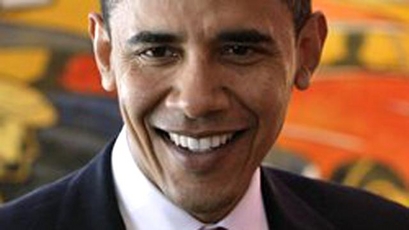LONDON – World stock markets fell Thursday amid mounting concerns about Greece's debt crisis. Disappointing earnings from Finnish mobile phone maker Nokia Corp. and a surprisingly big jump in U.S. factory gate price did nothing to turn sentiment around.
In Europe, the FTSE 100 index of leading British shares was down 61.98 points, or 1.1 percent, at 5,661.45 while Germany's DAX fell 82.38 points, or 1.3 percent, to 6,148. The CAC-40 in France was 70.24 points, or 1.8 percent, lower at 3,907.43.
And on Wall Street, the Dow Jones industrial average was 76.48 points, or 0.7 percent, lower at 11,048.44 while the broader Standard & Poor's 500 futures fell 9.48 points, or 0.8 percent, to 1,196.46.
Once again, jitters about Greece's financial future dominated sentiment, after the European Union's statistics office Eurostat said the country's budget deficit in 2009 was way more than previously thought at a time the country is considering whether to tap a bailout facility from its 15 partners in the eurozone and the International Monetary Fund.
Eurostat said the budget deficit in 2009 as a percentage of economic output was 13.6 percent — that's up from the previous estimate of 12.9 percent and nearly double the 7.7 percent recorded in 2008.
Greece's government total debt as a proportion of GDP stands at a massive 115.1 percent, a burden so large that some analysts think it will have trouble paying it over coming years even if a bailout saves Athens from default this year.
Eurostat also warned that the Greek figures may actually be even worse, citing "uncertainties" over the figures related to social security funds and the recording of complex financial swap arrangements.
Further bad news emerged as ratings agency Moody's Investor Services downgraded its rating on Greece's debt by one notch to A3 from A2, and warned that further downgrades were a distinct possibility.
"This decision is based on Moody's view that there is a significant risk that debt may only stabilize at a higher and more costly level than previously estimated," the agency said.
The cumulative impact of the Eurostat figures and the Moody's downgrade led to another flight away from Greek bonds.
The yield on the country's five-year bonds has spiked to a massive 8.85 percent from just above 8 percent Wednesday, while the equivalent rate for 10-year issues has risen to 8.4 percent from 8.05 percent, taking the spread between Greek and German bond yields up to 5.3 percentage points.
Analysts say that spread will make it impossible for Greece to tap the markets for cash to meet its upcoming debt obligations and reduce its budget deficit by four percentage points this year.
Markets increasingly think the Greek government, led by Prime Minister George Papandreou, will have no choice but to call upon the bailout facility agreed in Brussels last month.
"The sooner the IMF and the EU swing into action, the better," said David Buik, markets analyst at BGC Partners.
Greece began talks Wednesday with the IMF, the European Central Bank and the European Commission on details of a rescue package to deal with its debt crisis.
The talks are expected to last at least ten days and are set to focus on the terms and conditions of the joint eurozone-IMF bailout plan agreed in Brussels earlier this month so the package can be activated quickly if Greece requests the aid — the eurozone has pledged euro30 billion in loans for this year but have not spelt out any longer-term commitments.
Sentiment was further dented when Nokia reported lower than expected net profit of euro349 million and a pretty downbeat outlook — the company's share price slid nearly 15 percent in the wake of the statement.
Further disappointment came with the news that U.S. producer prices spiked 0.7 percent in March. That was more than the 0.4 percent climb expected in the markets and came as food prices surged by their fastest pace in 26 years.
Earlier in Asia, Japan's Nikkei 225 stock index dropped 140.96 points, or 1.3 percent, to 10,949.09 despite news that the nation's exports expanded for a fourth straight month in March.
Elsewhere, Hong Kong's main stock index shed 0.3 percent to 21,454.94 and South Korea's Kospi lost 0.5 percent to 1,739.52. China's Shanghai index retreated 1.1 percent to 2,999.48.
In the currency markets, the euro was dogged by the developments regarding the Greek debt crisis, falling 0.7 percent to $1.3387.
The pound was also in focus, trading 0.3 percent lower on the day at $1.5355 ahead of the next leaders' debate in Britain's general election campaign — the election is two weeks from today.
Following last week's debate, Britain's perennial third-party, the Liberal Democrats, enjoyed a massive boost in the opinion polls after its leader Nick Clegg was widely considered to have emerged the victor over his counterparts in the Labour Party and the Conservative Party, Gordon Brown and David Cameron.
The boost in the fortunes of the Liberal Democrats ratcheted up market expectations that the outcome of the election could be tight and that some sort of horse-trading will be required following the results.
The markets don't like uncertainty, especially at a time when investors await measures to deal with Britain's debts — figures earlier provided some comfort though as the budget deficit in the fiscal year to end-March was 3 billion pounds lower than the government's last forecast.
"This was a little smaller than the government's estimates but, insofar as it was the largest deficit since World War II, this is little cause for celebration," said Jane Foley, research director at Forex.com
In oil markets, benchmark crude was down $1.47 at $83.14 a barrel.
____
AP Business Writer Jeremiah Marquez in Hong Kong contributed to this report.
http://news.yahoo.com/s/ap/20100422/ap_on_bi_ge/world_markets



Tidak ada komentar:
Posting Komentar